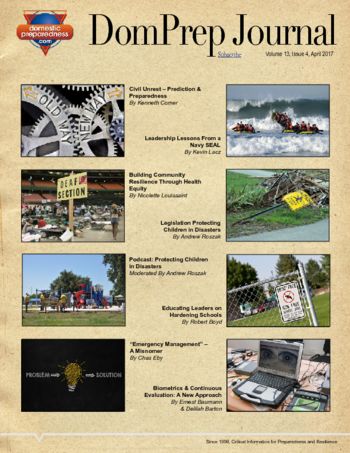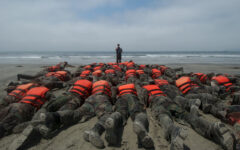

“Emergency Management” – A Misnomer
Chas Eby
April 26, 2017
“Emergency management” is a term broadly defining a field that includes federal, state, and local government agencies, voluntary organizations active in disasters, and private sector stakeholders that conduct a variety of

Leadership Lessons From a Navy SEAL
Kevin Lacz
April 26, 2017
Valuable leadership principles learned in military operations can be effectively applied to leaders in the civilian world. However, complacency and comfort zones are often the barriers to such success. Being

Biometrics & Continuous Evaluation: A New Approach
Ernest Baumann and Delilah Barton
April 24, 2017
Increased focus on insider threats has resulted in greater attention to background screening and automated methods to assist the vetting process for initial and continued access to secure facilities and classified information. Recent technology applications can provide investigators with an ever-increasing variety of data for screening and continued vetting. Applying this model to homeland security and emergency management, however, presents broader cultural issues, including information privacy and interoperability.

Educating Leaders on Hardening Schools
Robert Boyd
April 19, 2017
The recent release of the 2017 Infrastructure Report Card is notable – not simply because it gave U.S. public schools a D+ grade on their overall condition, but due to its failure

Legislation Protecting Children in Disasters
Andrew R. Roszak
April 19, 2017
Emergencies and disasters can have a profound impact on children. However, in 2004-2012, less than $0.01 of every $10 invested by federal emergency preparedness grants went to activities geared toward improving children’s safety. As the federal government plays a major role in funding and directing emergency preparedness, it is encouraging to see recent legislative and policy developments designed to increase planning and preparation for children of all ages.

Civil Unrest – Prediction & Preparedness
Kenneth Comer
April 11, 2017
Civil unrest, regardless of cause, creates unexpected risks to lives and property. Predicting the timing and scale of these events would allow for better tactical management and a more effective training process. However, theoretical work by complex systems scientists and real-world experiences of first responders make a strong case that such forecasting may be impossible. Still, recent advances in understanding complex systems can provide profound contributions to the preparedness community.

Building Community Resilience Through Health Equity
Nicolette Louissaint
April 5, 2017
Each person is affected by disasters in different ways. However, the reasons for these disparities stem from factors that can and should be addressed pre-disaster. The public health field is implementing measures to address at-risk communities and to help mitigate public health threats, which increase in magnitude during disasters. The equitable efforts of five cities are shared in this article.

